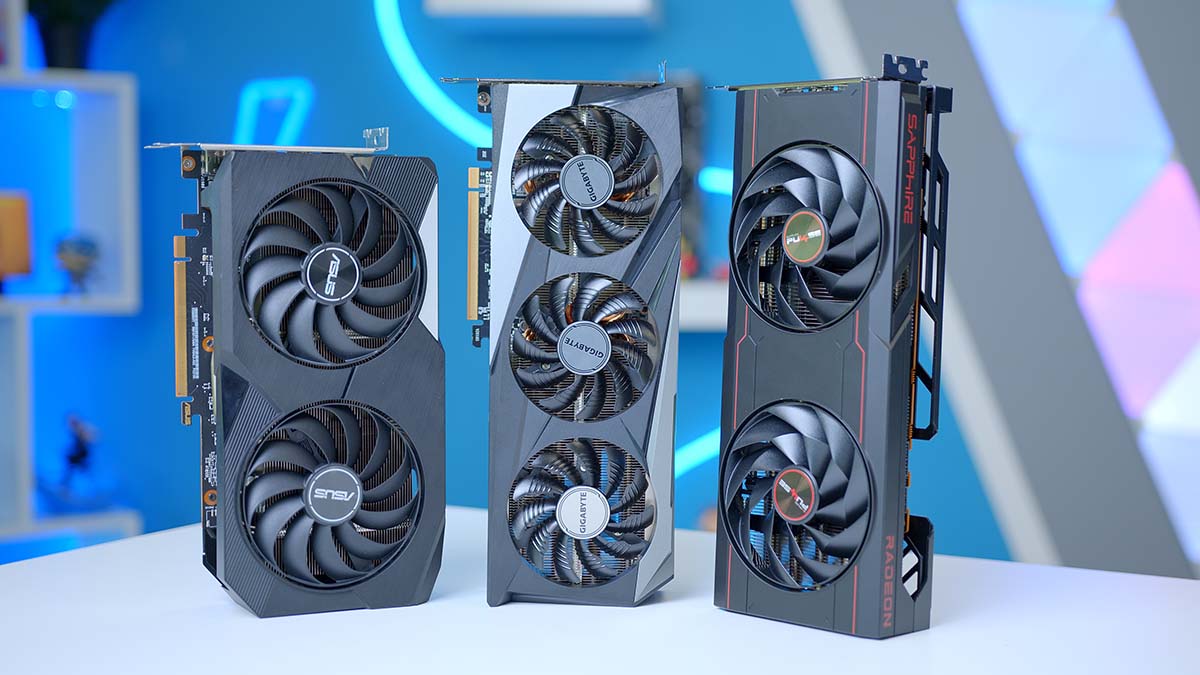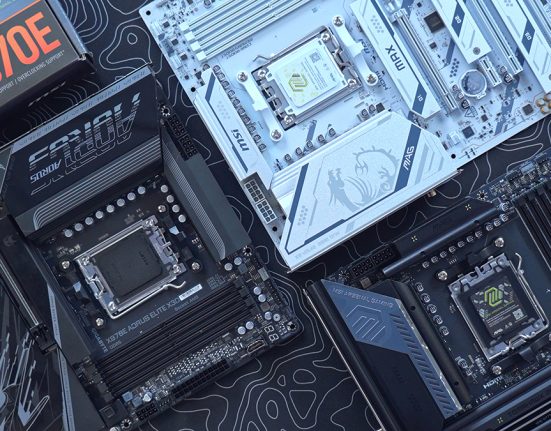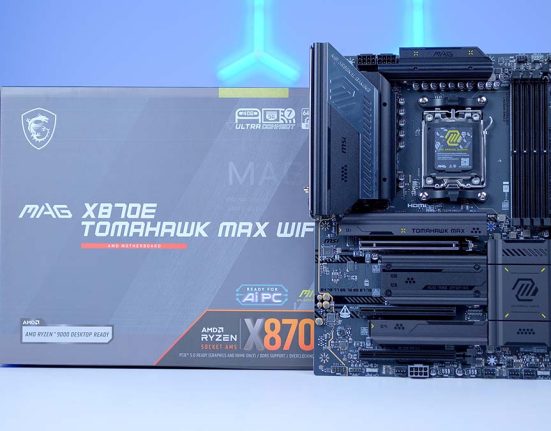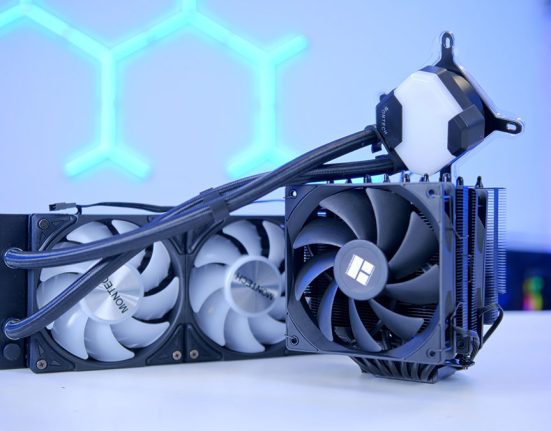Those in the market for a new graphics card have three major brands to choose from: Intel, AMD, and NVIDIA. Due to their competitive pricing and robust RDNA 3 architecture, AMD has become a firm favourite among price-conscious gamers looking to secure a high-performance card. However, with a vast selection of different GPU ranges that cater to varying use cases, determining the best AMD graphics card to buy for your PC build is a complicated decision.
To make this easier, we’ve tested a selection of AMD graphics cards in a GeekaWhat gauntlet of benchmarks covering budget, mid-range, and high-end PC builds. This buyers guide explains why all of the cards we’ve selected are excellent choices, with an in-depth analysis of the hardware, features, performance, and pricing.
The Best AMD Graphics Cards
1. AMD Radeon RX 7600

The budget entry in the AMD Radeon 7000 range is the RX 7600, one of the cheapest graphics cards on the market. The RX 7600 is one of the only GPUs below $300, initially hitting the market with a $269 MSRP. Because of its tantalisingly low price point, the RX 7600 is an excellent pickup for budget PC builds, geared explicitly at those looking to play games at 1080p.
Specs-wise, the RX 7600 has 8GB of GDDR6 VRAM on a 128-bit memory bus. The base and boost clock speeds are solid, at 1.72GHz and 2.65GHz, respectively. The RX 7600 also has a rated TDP of 165W, so thermals are generally pretty low compared to other cards.
On the performance front, the RX 7600 is a strong competitor at 1080p. It offers solid performance in Esports games and has decent legs in AAA titles. Technologies like FSR and Fluid Motion Frames help bolster framerates, improving overall gameplay performance and perceived smoothness. In COD Warzone (which offers FSR compatibility), we saw a 121FPS average framerate from the RX 7600 at 1080p, which is very solid considering how cheap this GPU is.
| Key Specs | AMD Radeon RX 7600 |
|---|---|
| Video Memory Capacity | 8GB GDDR6 |
| Memory Bus | 128-Bit |
| Base Clock Speed | 1.72GHz |
| Boost Clock Speed | 2.65GHz |
| Stream Processors | 2048 |
| Ray Accelerators | 32 |
| Power Draw | 165W |
| MSRP | $269 |
Unfortunately, the 8GB of GDDR6 VRAM and 128-bit memory bus limit the RX 7600’s performance. With games becoming increasingly demanding every year, 8GB of VRAM isn’t enough for modern titles, resulting in a market where 10GB or 12GB of VRAM is the preferred capacity. However, despite the RX 7600 being more restricted in new games, it can still handle Esports titles very well at 1080p, making it a great choice for true-budget systems.


Suggested Article: Best GPUs to Buy in 2024: Graphics Cards for All Budgets?
2. AMD Radeon RX 6750 XT

The RX 6750 XT is the next step up in this roundup, catering to gamers looking to play more modern titles or dabble in 1440p. Despite being an older graphics card, we’ve included it because it retains a great price point compared to other modern graphics cards. After several price drops, the RX 6750 XT is a 1440p capable GPU that sits below $350, which makes it a highly competitive offering versus NVIDIA, Intel, and AMD’s flagship cards.
The RX 6750 XT has 12GB of GDDR6 VRAM on a 192-bit memory bus, compared to the 8GB and 128-bit memory bus on the RX 7600. One of the big separators between the RX 6750 XT and RX 7600 is each card’s architecture: RDNA 2 and RDNA 3, respectively. While RDNA 2 is still incredibly robust, RDNA 3 offers stronger performance and more compute power, yielding better results in rasterised gameplay, which makes cards like the RX 7700 XT and RX 7800 XT worth the extra spend over picking up a Radeon 6000 graphics card.
But despite this, the RX 6750 XT is a highly capable GPU at 1440p, offering more than 60FPS in most modern titles. During our benchmarking runs, in Hogwarts Legacy and Apex Legends at 1440p, the RX 6750 XT offered 85FPS and 163FPS. The increased VRAM capacity and memory bus compared to the RX 7600 is why the RX 6750 XT thrives at 1440p, as more bandwidth can be dedicated to games.
| Key Specs | AMD Radeon RX 6750 XT |
|---|---|
| Video Memory Capacity | 12GB GDDR6 |
| Memory Bus | 192-Bit |
| Base Clock Speed | 2.15GHz |
| Boost Clock Speed | 2.6GHz |
| Stream Processors | 2560 |
| Ray Accelerators | 40 |
| Power Draw | 250W |
| MSRP | $549 |
The RX 6750 XT is a solid graphics card, but we recommend picking it up while stocks last. Due to its age, the RX 6750 XT will likely be discontinued within the following year. For this reason, we urge prospective buyers to pick up the RX 6750 XT sooner rather than later, as stock won’t last forever.


3. AMD Radeon RX 7700 XT

The AMD Radeon RX 7700 XT is a mid-range graphics card primarily geared towards 1440p gaming. To remain price competitive, a selection of Radeon 7000 graphics cards have had their prices slashed, further increasing the value proposition compared to the majority of NVIDIA’s flagship cards. During the RTX 4000 SUPER launch, the RX 7700 XT was one of these GPUs that saw a price drop to $400, with some alternative branded cards sitting at $20 or $30 more.
Looking at the specs, the RX 7700 XT has 12GB of GDDR6 VRAM and a 192-bit memory bus, similar to the RX 6750 XT. Clock speeds are also relatively similar, with the RX 7700 XT offering a 2.54GHz boost speed compared to the 2.6GHz speed on the RX 6750 XT. The RX 7700 XT comes with 3456 stream processors and 54 ray accelerators, which improves rasterised gameplay performance.
The RX 7700 XT is more than capable at 1440p, outputting solid framerates in Esports games and modern AAA titles. For example, in Hogwarts Legacy, we saw an average of 92FPS at 1440p high settings, which is incredibly smooth considering how intensive this title can be.
| Key Specs | AMD Radeon RX 7700 XT |
|---|---|
| Video Memory Capacity | 12GB GDDR6 |
| Memory Bus | 192-Bit |
| Base Clock Speed | 1.43GHz |
| Boost Clock Speed | 2.54GHz |
| Stream Processors | 3456 |
| Ray Accelerators | 54 |
| Power Draw | 245W |
| MSRP | $449 |
Oddly, the biggest competitor to the RX 7700 XT is the RX 7800 XT, which is only $50 more expensive. While we understand price-conscious buyers will want to avoid spending out of budget, the $50 price increase for the RX 7800 XT is an easy pill to swallow, considering the performance bonuses that come with this card.


4. AMD Radeon RX 7800 XT

At just $50 more than the RX 7700 XT, the AMD Radeon RX 7800 XT is one of the most impressive mid-range graphics cards to release within the past few years. The RX 7800 XT launched when the mid-range market lacked options due to the vast majority of NVIDIA alternatives sitting at prices that didn’t match the performance of the available card SKUs. But with the release of the RX 7800 XT, gamers can pick up a sub-$500 graphics card that offers exceptional rasterised performance.
Hardware-wise, the RX 7800 XT comes with 16GB of GDDR6 VRAM on a 256-bit memory bus, which is a significant step up from the 12GB and 192-bit memory bus on the RX 7700 XT. Cores and clock speeds mostly remain the same, but the RX 7800 XT sees an increase in core counts, up to 3840 stream processors and 60 ray accelerators, compared to 3456 and 54 on the RX 7700 XT.
The RX 7800 XT is among the best graphics cards for 1440p rasterised performance. In the vast majority of our benchmarks, the RX 7800 XT is one of the few cards at this price point hitting over 100FPS in most games at 1440p, with 102FPS in Hogwarts Legacy and 143FPS in COD Warzone. The RTX 4070 SUPER and RTX 4070 Ti are the only graphics cards that come remotely close, and both are priced significantly higher than the RX 7800 XT.
| Key Specs | AMD Radeon RX 7800 XT |
|---|---|
| Video Memory Capacity | 16GB GDDR6 |
| Memory Bus | 256-Bit |
| Base Clock Speed | 1.29GHz |
| Boost Clock Speed | 2.43GHz |
| Stream Processors | 3840 |
| Ray Accelerators | 60 |
| Power Draw | 263W |
| MSRP | $499 |
While rasterised performance is a clear, strong point of the RX 7800 XT, ray tracing gameplay is not. AMD hasn’t entirely caught up with ray tracing yet, resulting in considerably weaker performance when compared to NVIDIA cards that dominate this space. Those looking to play games with ray tracing switched on will want to consider a slightly higher-priced NVIDIA alternative.


5. AMD Radeon RX 7900 XT

The AMD Radeon RX 7900 XT has significantly increased in value proposition due to a range of price drops. The RX 7900 XT was initially launched at a price that most considered too high, considering that for around $100 more, at the time, PC builders could upgrade to the RX 7900 XTX, a significantly more powerful card. However, in a bid to remain competitive, AMD dropped the initial $899 MSRP during the RTX 4000 SUPER launch to around $700, making the RX 7900 XT a relatively affordable 4K capable graphics card.
With 20GB of GDDR6 VRAM and a 320-bit memory bus (which is a considerable improvement compared to NVIDIA cards sitting around the same price point), the RX 7900 XT is a mighty GPU. Stream processors and ray accelerators rise from 3840 and 60 on the RX 7800 XT to 5376 and 84 on the RX 7900 XT, increasing rasterised performance and providing much more dedicated compute power for FSR and Fluid Motion Frames.
The RX 7900 XT is a very capable graphics card at 1440p but is primarily geared towards 4K gaming, competing with the RTX 4070 Ti SUPER and RTX 4080 SUPER. At 4K high settings in Apex Legends and Hogwarts Legacy, the RX 7900 XT offered average framerates of 188FPS and 88FPS, respectively, demonstrating excellent metrics at higher resolutions.
| Key Specs | AMD Radeon RX 7900 XT |
|---|---|
| Video Memory Capacity | 20GB GDDR6 |
| Memory Bus | 320-Bit |
| Base Clock Speed | 1.38GHz |
| Boost Clock Speed | 2.39GHz |
| Stream Processors | 5376 |
| Ray Accelerators | 84 |
| Power Draw | 300W |
| MSRP | $699 |
Admittedly, as we climb the performance ladder, ray tracing metrics for AMD cards don’t improve. The RX 7900 XT, while a master in rasterised gameplay, struggles when ray tracing is switched on. For this reason, an NVIDIA alternative like the RTX 4070 Ti SUPER is worth considering for those prioritising ray traced performance.


6. AMD Radeon RX 7900 XTX

The Radeon RX 7900 XTX is AMD’s most powerful Radeon 7000 graphics card set to compete with the original RTX 4080 and now the RTX 4080 SUPER. The RX 7900 XTX initially hit the market with an MSRP of $999, which was far better than the $1199 MSRP of the standard RTX 4080. With a drop in price to $929, the RX 7900 XTX remains incredibly competitive versus top-end NVIDIA cards.
The RDNA 3 architecture allows Radeon 7000 cards to utilise more VRAM, which is why the RX 7900 XTX has 24GB of GDDR6 memory, the same amount as the RTX 4090. It has a 384-bit memory bus, 6144 stream processors, and 96 ray accelerators. This card also has a higher power draw of 355W, which makes it the most power-hungry AMD gaming GPU.
The RX 7900 XTX is geared towards 4K gaming and offers exceptional framerates at this high resolution. In our testing, we’ve seen the RX 7900 XTX go head to head with the RTX 4080 and RTX 4080 SUPER, offering some of the best generational performance money can buy. In Hogwarts Legacy at 4K high settings, the RX 7900 XTX outputs 96FPS, placing it at the top of our benchmarking results below the RTX 4090.
| Key Specs | AMD Radeon RX 7900 XTX |
|---|---|
| Video Memory Capacity | 24GB GDDR6 |
| Memory Bus | 384-Bit |
| Base Clock Speed | 1.92GHz |
| Boost Clock Speed | 2.49GHz |
| Stream Processors | 6144 |
| Ray Accelerators | 96 |
| Power Draw | 355W |
| MSRP | $929 |
The AMD Radeon RX 7900 XTX is an undoubtedly impressive graphics card, but the RTX 4080 SUPER is a highly competitive option. Offering very similar performance with the additional benefits of ray traced gameplay, DLSS, and Frame Generation, the $70 price bump for the RTX 4080 SUPER is highly compelling for those building a top-end gaming PC.


How We Tested the Best AMD Graphics Cards
COD Warzone (DLSS Quality)
Settings: 1080p, Upscaling/Sharpening FSR 2.1/DLSS Quality (80 Sharpness), Texture Resolution High, Texture Filter Anisotopic High, Level of Detail High
In Warzone at 1080p with FSR enabled, results are pretty strong across the board. The RX 7900 XT comes out on top with a 168FPS average, and the RX 6750 XT sits between the RTX 3070 and 3060 Ti with 132FPS on offer.

The RX 7600’s performance is particularly worth noting here. It outperforms the RX 6750 XT at 1080p despite having less VRAM and a weaker memory bus. This is likely due to the efficiency of FSR, which has access to more computing power with Radeon 7000 graphics cards.
The RX 7700 XT and RX 7800 XT results are close in this benchmark, with 7FPS between them at 145FPS and 152FPS, respectively. Ultimately, at 1080p, CPU power becomes more important due to having fewer pixels, so a graphics card upgrade won’t drastically improve gameplay smoothness.
COD Warzone @ 1440p (DLSS Quality)
Settings: 1440p, Upscaling/Sharpening FSR 2.1/DLSS Quality (80 Sharpness), Texture Resolution High, Texture Filter Anisotopic High, Level of Detail High
In COD Warzone at 1440p, our benchmarking results are more spaced apart, and you can see the difference in performance based on the card’s class. The RX 6750 XT and RX 7600 offered the same performance at 121FPS, which is still great to see at this higher resolution despite both cards being budget GPUs.

Moving up to the RX 7700 XT and RX 7800 XT, these graphics cards teetered around the 144Hz sweet spot. The RX 7700 output 137FPS, while the RX 7800 XT sat at 143FPS, a mere 1FPS away from an excellent refresh rate.
At the top end is a distinct, noticeable framerate jump way beyond what most gamers will ever need. The RX 7900 XT held firm at 167FPS, while the RX 7900 XTX provided an astounding 195FPS, just seven frames away from the RTX 4090.
Apex Legends
Settings: 1440p, Anti-aliasing TSAA, Texture Filtering 8X, Model Detail High, VSync Disabled, Effects High, Ambient Occlusion Quality High
All the AMD GPUs we tested performed very well in Apex Legends at 1440p. The RX 7600 immediately surpassed the 144Hz sweet spot, with the RX 6750 XT pushing this further with a 163FPS average.

Climbing up the ladder, the RX 7700 XT sits close to the RX 6750 XT, providing an average frame rate of 175FPS, just twelve frames between them. However, the RX 7800 XT is in a league of its own, soaring past all of the competition with an output of 232FPS, showcasing its formidable rasterised capabilities.
Unsurprisingly, the RX 7900 XT and RX 7900 XTX were leaders in this benchmark, sitting at 263FS and 288FPS, respectively. Ultimately, Apex Legends is optimised enough that a top-end card isn’t required in this game at 1440p, but it’s good to know that the high-end cards are more than capable at 1440p.
Hogwarts Legacy
Settings: 1440p, Shadow Quality High, Indirect Lighting High, Reflections High, Crowd Density High, Particle Quality High, Volumetric Lighting High, Motion Blur off, GTAO Quality High, Grass Quality High, Contact Shadows High VSync Off, DLSS/FSR: On/Off, Ray Tracing: On/Off, Textures: High
In Hogwarts Legacy, we’re seeing diminished performance across the board due to the game’s demanding system requirements. Despite this, the RX 7600 still provided 64FPS on average, which is ample for a smooth gameplay experience. The RX 6750 XT leapt up to 85FPS, primarily due to the increased VRAM capacity and memory bus.

The RX 7700 XT and RX 7800 XT sat close together in this benchmarking run. At 92 FPS and 102FPS, respectively, there was only a 10FPS difference, which shows how rough Hogwarts Legacy can be even with cards that are great in rasterised gameplay.
While the RX 7900 XT and RX 7900 XTX performed much better in Hogwarts Legacy than the mid-range and budget cards, the performance difference isn’t huge. While there are benefits to owning a top-end card in certain AAA games, mid-range GPUs are still equally competitive regarding framerates.
Hogwarts Legacy @ 4K
Settings: 4K, Shadow Quality High, Indirect Lighting High, Reflections High, Crowd Density High, Particle Quality High, Volumetric Lighting High, Motion Blur off, GTAO Quality High, Grass Quality High, Contact Shadows High VSync Off, DLSS/FSR: On/Off, Ray Tracing: On/Off, Textures: High
For our final benchmark, we dialled up the resolution in Hogwarts Legacy to 4K, testing the three most powerful cards in this roundup. Overall, performance is very close, with the RX 7900 XT and RX 7900 XTX sitting at 88FPS and 96FPS, respectively. While the RX 7800 XT does have good legs at 4K, Hogwarts Legacy is clearly proving too much for this card, with the RX 7800 XT offering a 65FPS average.

Frequently Asked Questions
Will My AMD GPU Work With an Intel CPU?
Yes! AMD GPUs are compatible with both AMD and Intel CPUs and will work perfectly fine with whichever is in your system.
Do AMD GPUs Have Ray-Tracing?
AMD GPUs can use ray tracing in supported games. However, their performance is not as strong as that of NVIDIA graphics cards, which have much more refined ray tracing drivers.
Does My AMD GPU Have DLSS?
AMD GPUs don’t support DLSS but have their own resolution scaling tech equivalent, Fidelity Super Resolution, or FSR for short.









![FI_[DM86] Montech King 45 Pro + RX 9070](https://geekawhat.com/wp-content/uploads/2026/01/FI_DM86-Montech-King-45-Pro-RX-9070-551x431.jpg)


![FI_[DM82] TT MineCUBE Build](https://geekawhat.com/wp-content/uploads/2025/12/FI_DM82-TT-MineCUBE-Build-551x431.jpg)
![FI_[DP056] Antec flux M + 9060XT](https://geekawhat.com/wp-content/uploads/2025/12/FI_DP056-Antec-flux-M-9060XT-551x431.jpg)
